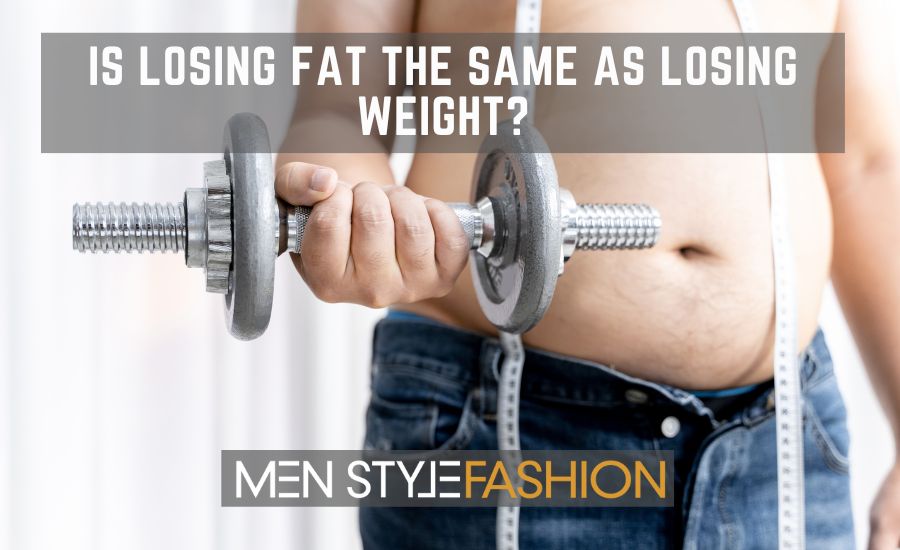Healthy life expectancy in decline
Feb 20, 2026Is Losing Fat The Same as Losing Weight?
- Oct 12, 2023
- 0 Comments
775

Understanding the differences between losing weight and losing fat is not just a matter of semantics, as it has implications for your approach to health and wellness. Many often mistake the two as interchangeable, yet each has unique variables and outcomes that can significantly impact your journey toward better health.
Definitions Matter: Fat and Weight
The terms “losing fat” and “losing weight” are often used interchangeably, but it’s important to differentiate between them. Losing weight can include a decrease in muscle mass, water, or even bone density in addition to fat. Losing fat, however, specifically pertains to a reduction in the fat stores in your body.
Factors Influencing Weight Loss
Various elements contribute to weight loss, and these aren’t limited to fat loss. Some of these include:
- Caloric Deficit: Consuming fewer calories than you burn leads to weight loss. However, it’s possible to lose weight without losing fat if you’re also losing muscle mass.
- Exercise: Physical activity can promote both weight and fat loss. The type of exercise you choose can influence which one you lose more of.
- Nutrition: Your diet plays a role. Protein-rich diets may help preserve muscle mass, focusing the weight loss more on fat loss.
- Hormones: Hormones like insulin and cortisol can affect how your body stores or burns fat and muscle.
Types of Fat: Subcutaneous and Visceral
When talking about fat loss, it’s also essential to know that not all fats are the same.
- Subcutaneous Fat: This fat lies under the skin and is generally less harmful.
- Visceral Fat: This fat surrounds internal organs and is associated with various health risks.
Measurement Techniques
Knowing whether you’re losing weight or fat can require different types of measurements.
- Scales: A standard scale will tell you your total body weight but can’t distinguish between fat and muscle.
- Body Composition Tests: Methods like DEXA scans can provide a more detailed look at your body’s composition.
- Tape Measures and Calipers: These tools can measure fat in specific areas, such as the waist, to give you an idea of fat loss.
Diet’s Role in Fat and Weight Loss
Food choices can make a substantial impact. Low-carbohydrate diets have been shown to help with quicker fat loss, while low-fat diets may lead to weight loss without significantly impacting fat stores.
Exercise and Its Effects
Exercise types can impact whether you lose weight or fat.
- Cardio: Often leads to weight loss but can also result in muscle loss if not combined with strength training.
- Strength Training: More likely to lead to fat loss while preserving or even increasing muscle mass.
Psychological Impacts
The mental effects can differ depending on whether you’re losing weight or fat. Losing weight rapidly can be encouraging but may not result in long-term changes in body composition. On the other hand, losing fat may take longer but often results in more lasting improvements in appearance and health.
What the Scale Doesn’t Show
It’s not uncommon for people to feel discouraged when their weight doesn’t change much even when they’re following a diet and exercise plan. This might be because they’re losing fat but gaining muscle, which is denser and takes up less space in the body.
A Medical Perspective
From a health standpoint, losing fat is generally considered better than just losing weight. Fat loss usually leads to improvements in markers like cholesterol levels, blood pressure, and insulin sensitivity, which aren’t guaranteed with weight loss alone.
The Role of Sleep in Weight and Fat Loss
Quality of sleep can play an unexpected role in both weight and fat loss. Inadequate sleep can disrupt hormone levels, leading to increased appetite and subsequently weight gain or a halt in weight loss. Therefore, incorporating good sleep hygiene can provide a meaningful boost to your fat and weight loss goals.
Medications and Their Influence
It’s worth noting that certain medications can affect weight and fat loss. Some medications may result in weight gain or make it more difficult to lose weight. If you’re struggling despite lifestyle changes, it may be worth consulting your healthcare provider to see if medication is a contributing factor.
Liquid Calories: A Silent Contributor
Be mindful of liquid calories. Beverages like sugary sodas, coffees, and smoothies can pack a large number of calories that contribute to weight gain but not necessarily fat gain. Opting for water, herbal teas, or low-calorie beverages can make a difference in your results.
Considering Plastic Surgery
For those who find that natural methods aren’t yielding the desired fat loss, plastic surgery can be an option. Procedures such as liposuction can remove fat from specific parts of the body. However, choosing a skilled and renowned surgeon like Dr. Neinstein NYC is vital for safe and effective results. It’s essential to do your due diligence and consult extensively before going down this route.
Maintenance After Loss
After achieving your desired level of weight or fat loss, maintaining the results is another critical aspect. Without a consistent, healthy lifestyle, it’s easy to revert back to older habits and see a return in weight or fat. Continuous exercise and a balanced diet are keys to maintaining your new body composition.
Individual Variability
Lastly, the speed and ease with which individuals lose weight or fat can vary greatly. Genetics, lifestyle, and individual metabolism all play roles.
Conclusion
By dissecting the complexities of weight loss and fat loss, you gain a perspective that allows for more targeted, effective approaches. This knowledge is beneficial and fundamental in aligning your actions with your health goals. To obtain the most personalized guidance, a consultation with healthcare professionals is advised.
Publisher: Source link







